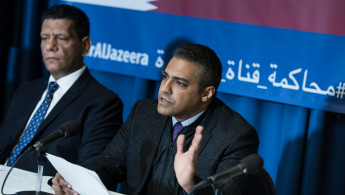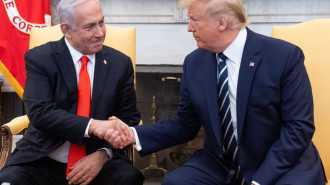Breadcrumb
Former Al-Jazeera journalist 'financially linked' to Emirati ambassador, NYT claims
Mohammed Fahmy, a journalist jailed by the Egyptian regime while he worked for Al-Jazeera, was given $250,000 to cover legal fees by the UAE's ambassador in Washington, NYT has claimed.
3 min read
Fahmy has launched a court case against Qatar [AFP]
Former Al-Jazeera reporter Mohammed Fahmy was allegedly given $250,000 by the controversial UAE ambassador to the US to help cover legal fees, the New York Times has claimed.
The Canadian journalist - who was jailed by the Egyptian regime on trumped up charged for his journalist work with Doha-based Al-Jazeera - has turned radically against his former employer following a number of claims against Qatar.
Fahmy admitted to the New York Times this week that he was given a substantial "loan" by UAE's ambassador to Washington Yousef al-Otaiba, which was used to fund a multi-million dollar court case against Qatar.
He also admitted this week to being a childhood friend of Otaibi, despite earlier claiming he didn't know the Emirati ambassador.
Fahmy said he hid the fact that both attended the same Cairo school to "protect a friend" but the admission adds another twist in the tale involving Fahmy, Otaiba and a regional crisis that has torn apart the Gulf.
A surveillance and hacking campaign aimed at Otaiba and Fahmy have revealed sensitive documents, including one allegedly showing a bank transaction of $250,000 between the UAE and the reporter via a third party, the New York Times allege.
He denies receiving money directly from Otaiba and that the money went to a third party, according to the US daily.
Fahmy also said that other claims in the investigation were fabrications made by Qatar and Al-Jazeera to ruin his reputation.
A Saudi-UAE led anti-Doha group has blockaded Qatar since last month and issued a 13-point ultimatum that expires on Sunday.
One of the key demands is the shuttering of Al-Jazeera and other media that have been critical of Middle East regimes and leaders, some of whom are allied to Riyadh and Abu Dhabi.
Among those criticised by the Qatari media group is Egyptian President Abdel Fattah al-Sisi who launched a coup against the democratically-elected Muslim Brotherhood.
He has also launched a fierce and repressive campaign against activists and supporters allegedly connected to the movement, killing or jailing thousands of Egyptians.
This included Fahmy and other Al-Jazeera English journalists based in Egypt.
The reporters were charged with trumped up charges such as spreading "fake news" and "supporting terrorism" leading to their imprisonment.
Widespread media outcry and campaigning by human rights groups eventually helped free the journalists.
Doha has been accused of supporting the Muslim Brotherhood by its Gulf neighbours and using its media outlets to target leaders such as Sisi.
The UAE which has been one of the leading critics of Qatar and has launched its own crusade against Islamists and pro-democracy activists in its emirates.
The Canadian journalist - who was jailed by the Egyptian regime on trumped up charged for his journalist work with Doha-based Al-Jazeera - has turned radically against his former employer following a number of claims against Qatar.
Fahmy admitted to the New York Times this week that he was given a substantial "loan" by UAE's ambassador to Washington Yousef al-Otaiba, which was used to fund a multi-million dollar court case against Qatar.
He also admitted this week to being a childhood friend of Otaibi, despite earlier claiming he didn't know the Emirati ambassador.
Fahmy said he hid the fact that both attended the same Cairo school to "protect a friend" but the admission adds another twist in the tale involving Fahmy, Otaiba and a regional crisis that has torn apart the Gulf.
A surveillance and hacking campaign aimed at Otaiba and Fahmy have revealed sensitive documents, including one allegedly showing a bank transaction of $250,000 between the UAE and the reporter via a third party, the New York Times allege.
He denies receiving money directly from Otaiba and that the money went to a third party, according to the US daily.
Fahmy also said that other claims in the investigation were fabrications made by Qatar and Al-Jazeera to ruin his reputation.
A Saudi-UAE led anti-Doha group has blockaded Qatar since last month and issued a 13-point ultimatum that expires on Sunday.
One of the key demands is the shuttering of Al-Jazeera and other media that have been critical of Middle East regimes and leaders, some of whom are allied to Riyadh and Abu Dhabi.
Among those criticised by the Qatari media group is Egyptian President Abdel Fattah al-Sisi who launched a coup against the democratically-elected Muslim Brotherhood.
He has also launched a fierce and repressive campaign against activists and supporters allegedly connected to the movement, killing or jailing thousands of Egyptians.
This included Fahmy and other Al-Jazeera English journalists based in Egypt.
The reporters were charged with trumped up charges such as spreading "fake news" and "supporting terrorism" leading to their imprisonment.
Widespread media outcry and campaigning by human rights groups eventually helped free the journalists.
Doha has been accused of supporting the Muslim Brotherhood by its Gulf neighbours and using its media outlets to target leaders such as Sisi.
The UAE which has been one of the leading critics of Qatar and has launched its own crusade against Islamists and pro-democracy activists in its emirates.







![Anthony Blinken speech [Getty] Anthony Blinken speech [Getty]](/sites/default/files/styles/image_684x385/public/media/images/6263436E-8ACD-4D3C-9055-25A7BE79DD5A.jpg?h=d1cb525d&itok=fLHmHCRG)
 Follow the Middle East's top stories in English at The New Arab on Google News
Follow the Middle East's top stories in English at The New Arab on Google News
![Paula Yacoubian was verbally attacked by Salim Aoun during a parliamentary session [Getty]](/sites/default/files/styles/image_330x185/public/1150162486.jpeg?h=b9615360&itok=xysBxMUJ)
![A UK watchdog claimed they received complaints about ads featured on the London Underground by UK company Wahed [Getty]](/sites/default/files/styles/image_330x185/public/2191229908.jpeg?h=38d368d7&itok=MjV-Rlf1)
